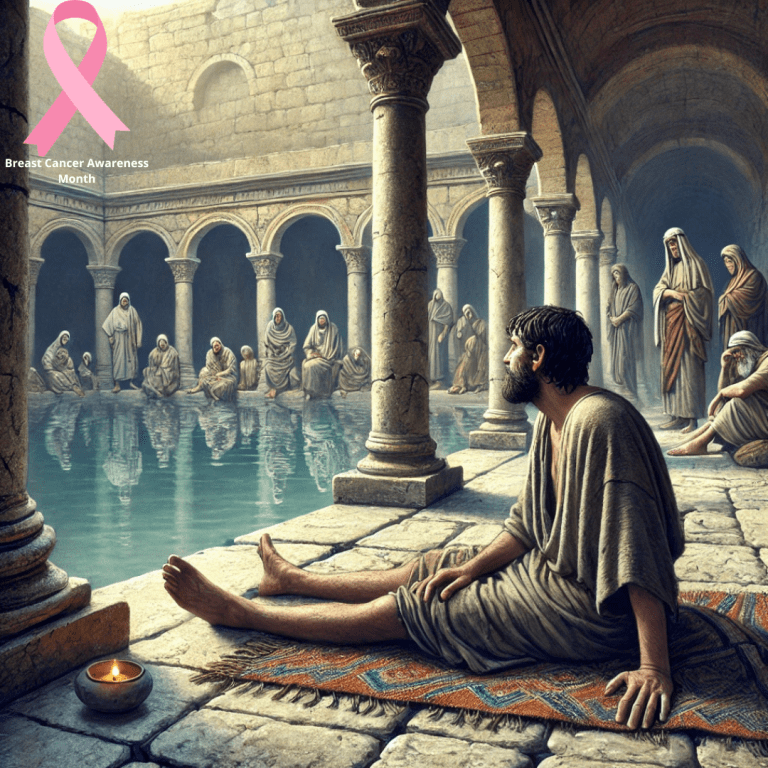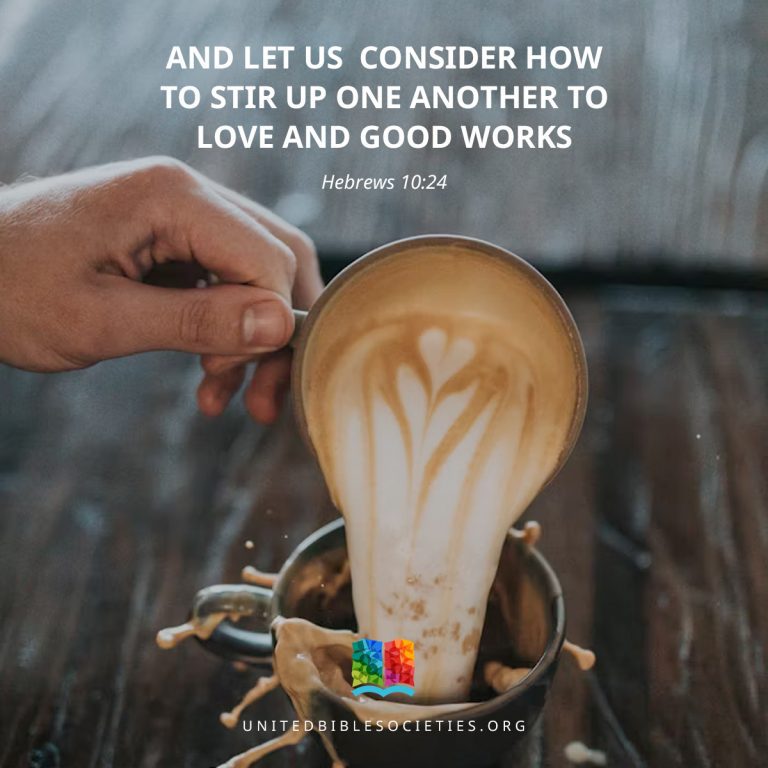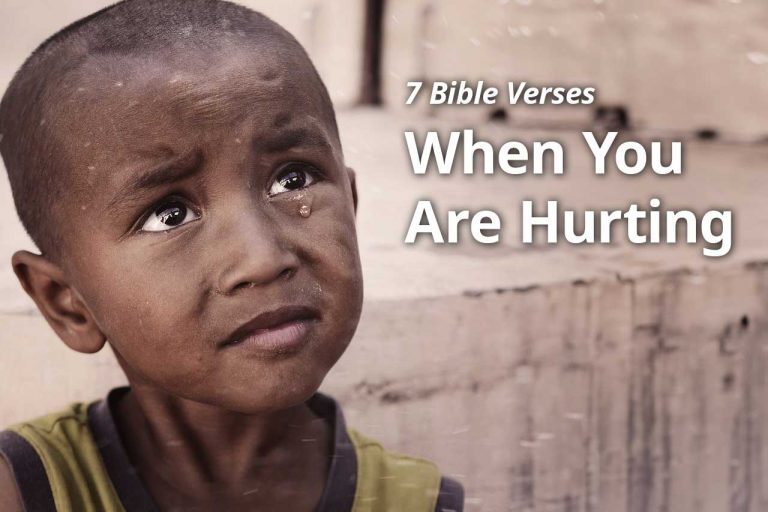The Healing at the Pool




























































1 After this, Jesus went to Jerusalem for a religious festival. 2 Near the Sheep Gate in Jerusalem there is a pool with five porches; in Hebrew it is called Bethzatha. 3 A large crowd of sick people were lying on the porches—the blind, the lame, and the paralyzed. 5 A man was there who had been sick for thirty-eight years. 6 Jesus saw him lying there, and he knew that the man had been sick for such a long time; so he asked him, “Do you want to get well?”
7 The sick man answered, “Sir, I don't have anyone here to put me in the pool when the water is stirred up; while I am trying to get in, somebody else gets there first.”








































8 Jesus said to him, “Get up, pick up your mat, and walk.” 9 Immediately the man got well; he picked up his mat and started walking.
The day this happened was a Sabbath, 10 so the Jewish authorities told the man who had been healed, “This is a Sabbath, and it is against our Law for you to carry your mat.”
11 He answered, “The man who made me well told me to pick up my mat and walk.”
12 They asked him, “Who is the man who told you to do this?”
13 But the man who had been healed did not know who Jesus was, for there was a crowd in that place, and Jesus had slipped away.




















14 Afterward, Jesus found him in the Temple and said, “Listen, you are well now; so stop sinning or something worse may happen to you.”
15 Then the man left and told the Jewish authorities that it was Jesus who had healed him. 16 So they began to persecute Jesus, because he had done this healing on a Sabbath. 17 Jesus answered them, “My Father is always working, and I too must work.”
18 This saying made the Jewish authorities all the more determined to kill him; not only had he broken the Sabbath law, but he had said that God was his own Father and in this way had made himself equal with God.
The Authority of the Son
19 So Jesus answered them, “I tell you the truth: the Son can do nothing on his own; he does only what he sees his Father doing. What the Father does, the Son also does. 20 For the Father loves the Son and shows him all that he himself is doing. He will show him even greater things to do than this, and you will all be amazed. 21 Just as the Father raises the dead and gives them life, in the same way the Son gives life to those he wants to. 22 Nor does the Father himself judge anyone. He has given his Son the full right to judge, 23 so that all will honor the Son in the same way as they honor the Father. Whoever does not honor the Son does not honor the Father who sent him.
24 “I am telling you the truth: those who hear my words and believe in him who sent me have eternal life. They will not be judged, but have already passed from death to life. 25 I am telling you the truth: the time is coming—the time has already come—when the dead will hear the voice of the Son of God, and those who hear it will come to life. 26 Just as the Father is himself the source of life, in the same way he has made his Son to be the source of life. 27 And he has given the Son the right to judge, because he is the Son of Man. 28 Do not be surprised at this; the time is coming when all the dead will hear his voice 29 and come out of their graves: those who have done good will rise and live, and those who have done evil will rise and be condemned.
Witnesses to Jesus
30 “I can do nothing on my own authority; I judge only as God tells me, so my judgment is right, because I am not trying to do what I want, but only what he who sent me wants.
31 “If I testify on my own behalf, what I say is not to be accepted as real proof. 32 But there is someone else who testifies on my behalf, and I know that what he says about me is true. 33 John is the one to whom you sent your messengers, and he spoke on behalf of the truth. 34 It is not that I must have a human witness; I say this only in order that you may be saved. 35 John was like a lamp, burning and shining, and you were willing for a while to enjoy his light. 36 But I have a witness on my behalf which is even greater than the witness that John gave: what I do, that is, the deeds my Father gave me to do, these speak on my behalf and show that the Father has sent me. 37 And the Father, who sent me, also testifies on my behalf. You have never heard his voice or seen his face, 38 and you do not keep his message in your hearts, for you do not believe in the one whom he sent. 39 You study the Scriptures, because you think that in them you will find eternal life. And these very Scriptures speak about me! 40 Yet you are not willing to come to me in order to have life.
41 “I am not looking for human praise. 42 But I know what kind of people you are, and I know that you have no love for God in your hearts. 43 I have come with my Father's authority, but you have not received me; when, however, someone comes with his own authority, you will receive him. 44 You like to receive praise from one another, but you do not try to win praise from the one who alone is God; how, then, can you believe me? 45 Do not think, however, that I am the one who will accuse you to my Father. Moses, in whom you have put your hope, is the very one who will accuse you. 46 If you had really believed Moses, you would have believed me, because he wrote about me. 47 But since you do not believe what he wrote, how can you believe what I say?”
Ŋen Yesu geid̶u ed̶a gaijəba gəbərlda
1 Orn d̶əsa nḏəfeṯe d̶ənəŋ d̶-Alyawuḏ na ŋen ŋafəṯia Yesu nəgabəṯa alo yi-Ursalim. 2 Na alo yi-Ursalim alo yafo yenəŋ eŋau, yafo ëuwər ṯwaiñ isi ibërnia Ëuwər yi-Yaŋala, na alo isi eŋau ibërnia egole g-Ibraniyin Beṯasd̶a, na yerṯo neldwa ano agwaŋ d̶enəŋ. 3 Na alo isei led̶a lwaiña kaiñ lwuma ləfau loɽaŋa, ləmaṯan laber ləbərlda na ləmaṯan laijəba aŋənoyia. [Led̶a ildi laṯurṯia d̶rəgud̶ia ŋawano. 4 Ŋen ŋanṯa malaiyəka d̶ikirəwaṯa eŋau ñoman ñəmən na ṯaiyrəgud̶u ŋawano, orn ed̶a girəwuṯu eŋau nëiñua liga ŋawa ŋrəgud̶əmano, nəŋeid̶ini eŋəɽaiñ iŋi ŋəfəma nano.] 5 Maje gənəŋ galo isei gafo gwuma nṯəlia ered̶ia giɽijin na alo d̶enəŋ nəməñe niɽijin. 6 Ndə Yesu gəseicəma gəndra naŋəmaləŋeṯe ṯa gaɽaŋo alo liga lwalano nəŋəmeiṯi ṯa, “Agwonaṯa agəbeid̶inia?” 7 Ed̶a gwuma nəŋəmeiṯi ṯa, “Ya Eləŋ egero ed̶a gəñirəweicia eŋau ndə ŋawa ŋrəgud̶əmano, na ndə igəmulu igirəwaṯa eŋau, ed̶a naŋela naŋirəwuṯi naŋəñəṯad̶e.”
8 Yesu nəŋəmeiṯi ṯa, “Twod̶o ŋape d̶əṯelia d̶əlaɽəŋa, ŋerlde ŋaɽe.” 9 Na taltal maje nəŋeid̶ini nəŋətwod̶e nəŋape d̶əṯelia nəŋəɽe. Na Loman ildei lafo lad̶əmiñəniano. 10 Ŋen ŋafəṯia Alyawuḏ niyeiṯi maje geid̶inu ṯa, “Loman ildi lad̶əmiñənṯano ŋen ŋëd̶əñinu ṯa agapa d̶əṯelia.” 11 Gënəŋu nəŋəluɽəbiṯi eŋen ṯa, “Ed̶a geid̶iñi galwaɽəṯiñi ṯa, yape d̶əṯelia d̶əlëɽəñi eɽe.” 12 Lënəŋulu ldəmeɽəd̶e ṯa, “Maje gəbërnia əsëgi gəlwaɽəṯiaŋa ṯa agapa d̶əṯelia ŋaɽe?” 13 Orn maje geid̶inu nəŋaŋəbeṯe ed̶a ṯa gəbërnia əsëgi, ŋen ŋanṯa led̶a lafo lwaiña na Yesu nəŋəməñe nəŋəɽe.
14 Nṯia Yesu nəŋəmafid̶i ig-Alekəl nəŋəmeiṯi ṯa, “Seicu agepi. ŋerṯe agëbəd̶ia ŋen ŋwomən ŋeicia kwai kwai, ṯa ŋen ŋeicia aŋerṯe ŋid̶i aŋëndi.” 15 Nṯia maje nəŋəməñe nəŋəlwaɽəṯi Alyawuḏ ṯa fəŋu Yesu igi geid̶əma. 16 Ŋen ŋafəṯia Alyawuḏ yatwod̶o nenanaice Yesu ŋen ŋubwa, ŋen ŋanṯa gënəŋu gëbəd̶ia ŋen iŋi e-Loman ləd̶əmiñəmano. 17 Orn Yesu nəŋəluɽəbiṯi eŋen ṯa, “Bapa gëbəd̶ia ŋəmëɽria d̶əñid̶i məldin na igëbəd̶ia ŋəmëɽria com.” 18 Ŋen ŋafəṯia Alyawuḏ ywonaṯa kaiñ yemaɽiña, gerṯe ŋen ŋanṯa gënəŋu gagero ŋen ŋə-Loman ləd̶əmiñəniano ikərəŋ, orn com gaɽwata ṯa Rəmwa raɽo Eṯen, nṯia gid̶u etam gəlëɽəŋu ləɽəwaṯo Rəmwara.
Ŋen ŋəŋələŋe ŋ-Id̶ia
19 Yesu nəŋəluɽəbiṯi eŋen ṯa, “Đeṯəm, d̶eṯəm, igandəlwaɽəṯia ṯa, Id̶ia gero gəɽwad̶aṯa gəbəd̶ia ŋen ŋənəŋ bəɽan, illi ndə gəseicia Đaṯa gəbəd̶ia ŋen ṯia. Ŋen ŋənəŋ iŋi Đaṯa gəbəd̶ia, Id̶ia gëbəd̶ia com. 20 Ŋen ŋanṯa Đaṯa gabwa Id̶iaga, na gamërrəŋaicia ŋen pred̶ gəbəd̶ia na gënəŋu gid̶i aŋəmërrəŋaici laŋge ləməñaṯo ŋen iŋi, ṯa ñagid̶i ñirəwano. 21 Ŋen ŋarno Đaṯa gəɽatud̶ia led̶a laiyo ṯaŋalid̶u ləməṯo, nṯia com Id̶ia gëbəd̶ia ed̶a gənəŋ aŋəməṯe igi gwonaṯa ṯa gaməṯia. 22 Na Đaṯa gaber gakəmia ed̶a gənəŋ, orn ganaico Id̶ia ŋen pred̶ ŋəd̶akəmia 23 ṯa led̶a pred̶ alnanaice Id̶ia d̶amia, ŋen ŋarno lənanaica Đaṯa d̶amia. Ed̶a gənəŋ gəber gənanaica Id̶ia d̶amia, gënəŋu gaber gənanaica Đaṯa d̶amia igi gəd̶waṯəma.
24 “Đeṯəm, d̶eṯəm, igandəlwaɽəṯia ṯa, ed̶a igi gəñənaṯa na nəŋəmaŋënṯi egare igi gəd̶waṯəñe, gënəŋu gerṯo d̶əməṯia d̶əbəɽəbəte, na gaber gid̶i aŋakəməni, orn gaməño eŋəɽaiñ d̶əge nəŋënṯi ed̶əməṯia. 25 Đeṯəm, d̶eṯəm, igandəlwaɽəṯia ṯa, liga lid̶i alela, d̶eṯəm leṯo d̶əge, ildi led̶a laiyo lid̶i alnau olia g-Id̶ia gə-Rəmwa, na lënəŋulu ildi ləno lid̶i aləməṯe. 26 Ŋen ŋarno Đaṯa gerṯo d̶əməṯia egətam gəlëɽəŋu, nṯia com gënəŋu ganaico Id̶ia ṯa aŋerṯe d̶əməṯia egətam gəlëɽəŋu, 27 nəŋəmanaice ŋabəɽa ṯa aŋakəməd̶e, ŋen ŋanṯa gënəŋu gaɽo Id̶ia gə-Led̶a. 28 Ñerṯe ñagirəwano eŋen iŋi ŋen ŋanṯa liga lid̶i alela ildi led̶a pred̶ ləfo erel lid̶i alnau olia gəlëɽəŋu, 29 na lid̶i altwod̶e. Led̶a ildi ləfo ləbəd̶ia ŋen ŋame lid̶i altwod̶e eŋəɽaiñ na aləməṯe, orn led̶a ildi ləfo ləbəd̶ia ŋen ŋeicia lid̶i altwod̶e eŋəɽaiñ na alakəməni.”
Ŋen ŋəd̶aməd̶aṯa eŋen ŋə-Yesu
30 Egero egəɽwad̶aṯa igəbəd̶ia ŋen ŋənəŋ bəɽan. Garno egənna, egakəməd̶ia na d̶akəmia d̶əlëɽəñi d̶ad̶urwaṯo ŋen ŋanṯa egaber igəbəd̶ia ŋen egwonaṯa, orn ŋen ŋəlëɽəŋu igi gəd̶waṯəñe. 31 Ndə igënəñi egerṯo d̶aməd̶aṯa d̶əlëɽəñi, d̶aməd̶aṯa d̶əlëɽəñi d̶ero d̶əɽia d̶eṯəm. 32 Orn fəŋu ed̶a gwomən gəɽo d̶aməd̶aṯa d̶əlëɽəñi na egaləŋeṯo ṯa d̶aməd̶aṯa d̶əlëɽəŋu id̶i iñi d̶aɽo d̶eṯəm. 33 Ñagəd̶weiṯu Yuanna led̶a na gënəŋu gaɽwato ŋen ŋəd̶aməd̶aṯa d̶əd̶eṯəm, 34 orn egaber igəbəŋënṯia d̶aməd̶aṯa d̶əled̶a lalo, orn igandəlwaɽəṯia ŋen iŋi ŋen ŋanṯa d̶əbërnia ed̶alo. 35 Yuanna gaɽo lamba ildi loɽa ləwad̶ialo na ñagafo ñagwonaṯa ñaŋəreṯe nano egarrerre gəlëɽəŋu iliga lətëfr. 36 Orn egerṯo d̶aməd̶aṯa d̶əməñaṯo orəba ge-Yuanna, ŋen ŋanṯa ŋəmëɽria iŋi Đaṯa gənaicəñe ṯa ebəɽenḏeṯe, d̶eṯəm ŋəmëɽria iŋi igəbəd̶ia ŋamama d̶aməd̶aṯa d̶əlëɽəñi, ṯa Đaṯa gad̶waṯəñe. 37 Đaṯa igi gəd̶waṯəñe gënəŋu gamama d̶aməd̶aṯa d̶əlëɽəñi. Ñagero ñagənna olia gəlëɽəŋu kwai kwai. Na ñagero ñaməseicia kwai kwai, 38 na ñagero ñagəberṯia ŋen ŋəlëɽəŋu ŋendialo enare enalo, ŋen ŋanṯa ñagaber ñagəbëndia ŋen ŋed̶a igi gënəŋu gəd̶waṯəma. 39 Gagwondəd̶r enad̶am nətəɽe ŋen ŋanṯa ñagabaṯa ṯa ñerṯe d̶əməṯia d̶əbəɽəbəte eŋen iŋi ŋəwërd̶ənu. Na nad̶am ini naɽwata ed̶aməd̶aṯa d̶əlëɽəñi! 40 Orn ñaganed̶o ñageṯəñe nano ṯa ñerṯe d̶əməṯia.
41 “Egaber igəbəŋënṯia d̶amia d̶əled̶a, 42 orn egaləŋeṯo d̶eṯəm ṯa ñagero d̶əbwa d̶ə-Rəmwa enare enalo. 43 Egeṯo irəŋga gə-Bapa gəlëɽəñi, orn ñaŋ ñaganed̶o ñagəñəŋënṯia. Ndə ed̶a gərto geṯo irəŋga gəlëɽəŋu na ñagid̶i ñəməŋenṯi. 44 Ñagaɽwad̶aṯa ñagəbëndia ŋen ṯau ndə ñaganəñaŋ ñəŋgi ñagəbërəŋënṯia d̶amia eled̶a lwomən bəɽan, orn ñaganed̶o ñagəpwaiña d̶amia id̶i d̶eṯo i-Rəmwa irri rəɽo ronto? 45 Ñerṯe ñagabaṯa ṯa fiñi igid̶i indəsəki e-Đaṯa. Ñagerṯo ed̶a gəndəsəkia, na fəŋu Musa igi ñagaṯa d̶wonaṯa ed̶alo d̶afəmau. 46 Gəbanṯa ñagëndu ŋen d̶eṯəm ŋə-Musa ṯa ñagëndu ŋen ŋəlëɽəñi com ŋen ŋanṯa gënəŋu gawërd̶u eŋen ŋəlëɽəñi. 47 Orn ndə ñagəber ñagəbëndia ŋen iŋi gënəŋu gəwërd̶u, fəṯau ñagid̶i ñëndi ŋen iŋi egəɽwata?”


